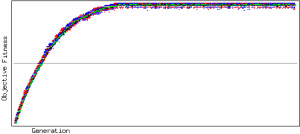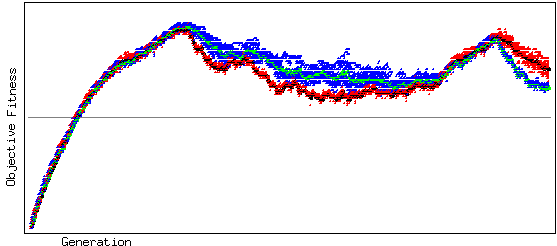

| Loss of Gradient: One idea of coevolution is that
each population provides a competitive gradient for the other. If everyone
in the population has the same results (ex: all loose) there is no selection,
while differing results allow selection for the 'best man'. But if the
opponents in one population get so good that they beat all the members
of the other population then we do not know which members within each population
are better. For example, suppose after learning the basic moves we sit
down to play with Kasparov, and we base our fitness as chess players on
our performance relative to Kasparov. After several days of playing, Kasparov
has beat us both every time. So we have no idea which among us is the better
player. We call this 'disengagement' .
In this experiment, each player only plays against one random member of the other population. Look for the dynamics of the populations showing two different phases. Sometimes both populations race upwards, at other times one population gets too far ahead of the other and disengages, and as a result both populations drift back to the neutral value of 50. Note that the downward trends correspond with times when the subjective fitnesses are 'polarised' - i.e everybody wins in one population and everybody looses in the other. |
The same situation with a sample size of 15 allows constant competition, and therefore steady improvement.
 |